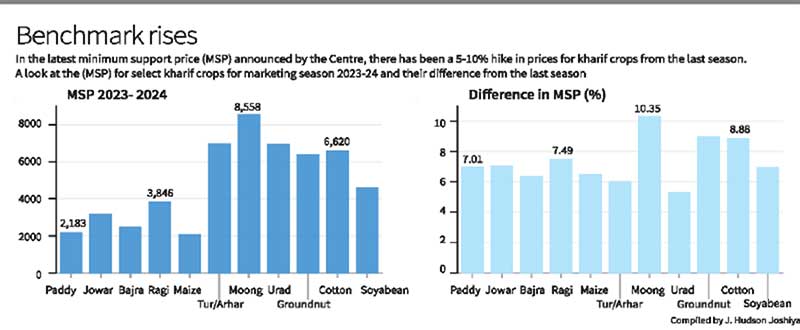Date : 13/06/2023
Relevance : GS Paper 3 : Agriculture
Key Points : MSP, Swaminathan Commission, Agricultural Reforms
Context-
-
The Minimum Support Price (MSP) hike for this year's summer (kharif) season crops has been announced by the government, aiming to ensure remunerative prices to farmers and encourage crop diversification. However, dissatisfaction among farmers and the need for comprehensive reforms persist.
MSP and Its Purpose:
- MSP is the price at which the government procures farmers' produce, serving as a tool to stabilize production and control consumer prices.
- Despite its intended benefits, farmers face challenges such as delayed procurement, exploitation by commission agents offering prices below MSP, and lack of awareness.
- Farmers demand a legal status for MSP and an assured market mechanism to ensure their produce is purchased at the MSP.
Government's MSP Announcement:
- The government recently declared the MSP for 17 kharif crops, including paddy, pulses, oilseeds, and cotton, for the 2023-24 marketing season. The MSP increase aligns with the objective of providing a reasonably fair remuneration to farmers, as stated in the Union Budget 2018-19.
- The government claims that this year's hike is the highest compared to previous years.
Farmers' Concerns and Proposed Solutions:
- Various farmer outfits have expressed discontentment with the latest MSP, considering it insufficient. Rising input costs coupled with an unfair MSP are expected to increase farmer indebtedness.
- The unfulfilled promise of implementing the Swaminathan Commission's recommendation of C2+50% (comprehensive cost of production) aggravates their dissatisfaction. Farmers propose making MSP a statutory right, binding the government and private players to procure crops at MSP, thus ensuring a remunerative price.
Expert Perspectives:
- Economist Dr. Ranjit Singh Ghuman emphasizes that effective implementation of MSP and procuring crops at MSP, especially for diverse crops, are crucial for crop diversification and higher farmers' incomes.
- Ensuring a legal status for MSP would compel private players to procure crops at MSP, benefiting both farmers and the environment.
- Experts believe that an increase in the MSP may give a slight respite to growers, but argue that in the absence of any dependable or assured market mechanism of procurement-purchase for crops on the MSP in most parts of the country, the purpose of encouraging “crop diversification” gets defeated.
- Notably, foodgrain stocks in the country are at a comfortable level, as per third advance estimates for 2022-23, total foodgrain production in the country is estimated at a record 330.5 million tonnes which is higher by 14.9 million tonnes compared to 2021-22, but delay in monsoons could impact non-irrigated regions.
Conclusion:
The MSP hike aims to strike a balance between the interests of farmers and consumers, providing fair returns to farmers while maintaining reasonable prices for consumers. However, the current discontentment among farmers calls for more comprehensive reforms. Ensuring an effective system for assured purchase and returns at MSP for major crops, similar to wheat and rice, or extending subsidies on input costs, could improve farmers' income and address their financial distress.
Probable Questions for Mains exam-
- Question 1 : Crop diversification is essential for sustainable agriculture and environmental conservation. Analyze how the ineffective implementation of MSP and the non-procurement of diverse crops at MSP hinder crop diversification efforts. Discuss the role of a legal status for MSP in promoting crop diversification and improving farmers' incomes (10 marks, 150 words)
- Question 2 : Critically analyze the role of agricultural price policies, including MSP, in achieving the government's objective of promoting sustainable and inclusive agriculture. Discuss the challenges faced in the implementation of these policies and propose strategies to overcome them for the benefit of farmers and the overall agricultural sector. (15 Marks, 250 Words)
Source : The Hindu






















